Edward Timothy Pierce, Principal, 1889-1893

Edward T. Pierce was born in New York State in 1851. He graduated from the New York Normal School at Albany and from the law school at Union University. Later he was awarded the degree of Doctor of Pedagogy. After teaching for a few years in New Jersey, he moved to California where he was Superintendent of the Pasadena school system from 1883 - 1889. In 1889, he was elected as the first principal of Chico Normal School.
In his autobiography, he said "I felt then and still feel that God can give no man or woman any higher or more exalted work than that of training teachers..." He also felt that in the four years he was in Chico the Normal School was a good moral and intellectual influence on the town.
As first principal, he chose the faculty, began recruiting students, and planned the curriculum for the normal school. As an administrator he was firm and instilled the institution with high moral and academic standards. He started the model training school in 1890.
Pierce was married in 1877 to Isabel Woodin who was also an educator and taught in the schools at Pasadena and at the Chico Normal School. In 1893, he left Chico to accept the position of president of the Los Angeles Normal School. He remained there until 1904 when he retired. He died in Sierra Madre in 1919.
Robert F. Pennell, Principal, 1893-1897
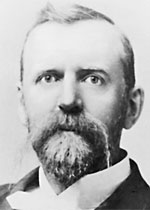
Robert F. Pennell was born in Maine in 1850 and received his AB degree from Harvard University. In 1889 he was principal of the Marysville schools in California and from 1890-1893 he was principal of the Stockton schools. In 1893, he was elected principal of the Normal School at Chico. During his term of office, he promoted the beginning of the Normal Record as the school newspaper and the upgraded or country school was added to the training school.
In an introduction to the Normal Record, he wrote " We are trying to lay our course on the broad foundation of scholarship and practical teaching".
In January 1896 the graduating class, which had arrived at the Normal School the same time he did, presented him with a gold-headed cane to show their respect and esteem. In 1897, a newly appointed Board of Trustees replaced him with Carlton Ritter.
Pennell and his wife, Eleanor, had one son. Robert Pennell died in San Francisco in 1905.
Carleton M. Ritter, President, 1897-1899
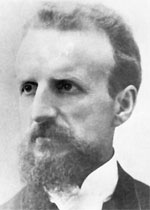
Carleton M. Ritter was born in New York State in 1850 and graduated from the New York State Normal School in Albany. In 1871, he became a school principal and mathematics teacher in Stockton, California where he remained until 1889. In that year, he was appointed to the first faculty of the State Normal School at Chico as a mathematics teacher. In 1897, he was elected president of the school.
His accomplishments as head of the normal school included the addition of a kindergarten department, the introduction of child study and philosophy of education classes, and the teaching of methods in science and history.
Ritter was married in 1881 to Matilda C. Peterson. They had a family of three sons.
When Ritter left Chico Normal School in 1899 he attended Stanford University for advanced work and then returned to Stockton as high school principal. He retired in 1906 and returned to the family farm in New York State. He came back to California in 1920 and died in Stockton in 1926.
Charles C. Van Liew, President, 1899–1910
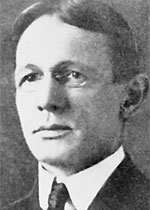
Charles C. Van Liew was born in 1862 and was educated through high school in Illinois. His PhD was earned in Germany at the University of Jena and the University of Leipzig in 1893. In 1888 he married Ida J. Traver and they had two children. He taught in normal schools in Illinois, was professor of psychology and pedagogy at the California Normal School at Los Angeles, and was superintendent of the training school. In 1899 he was elected president of the Normal School at Chico.
Dr. Van Liew took an active part in improving education in California, serving on statewide committees. His publications included "Normal Schools of California: and "Phonics and Reading".
In 1910 he was ousted by the Board of Trustees, at the direction of Governor Gillett, for unprofessional conduct, although earlier the Board had held a hearing and exonerated him.
After leaving Chico, he worked with textbook companies in the San Francisco area. He retired in 1938 and died in 1946.
Allison Ware, President, 1910-1917

Under Allison Ware's leadership, the preparatory department of the Chico State Normal School decreased, while the professional department grew. Due to the increase in the number of high schools the preparatory department gradually closed. Ware also was instrumental in the establishment of the model rural training school.
In August 1917, Ware took leave to attend the Officers Reserve Training Camp in San Francisco. In November 1917, he was assigned to the 53rd Infantry in Nogales and he offered his resignation which was rejected. In May 1918, his resignation was accepted.
In 1919, he was discharged from the Army and set up a law practice in Chico. His first wife, Maude Boyne, died in 1954, and he married Pansy Laughlin. Allison Ware was honored at the Chico State Homecoming in 1956 and died in November of that year.
Elmer Isaiah Miller, Acting President, 1917-1918

Elmer Isaiah Miller was born in Ohio in 1862 and attended Ohio Normal University. He had an AB and a MA from Stanford and was a principal at Palo Alto High School. In 1907, he received a PhD from Columbia University.
Miller was active in Chico community affairs and in educational interests in Chico and the state. He was named acting president for a brief time between Van Liew's departure and Allison Ware's arrival in 1910. He was also named acting president when Ware took a leave of absence for military training and service in the U.S. Army in 1917.
Charles Osenbaugh, President, 1918-1930
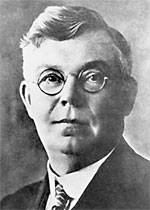
In 1918 Charles Osenbaugh was elected president of Chico State Normal School. In 1921 the school became Chico State Teachers College and began to offer a bachelor's degree with a four-year curriculum.
Osenbaugh began the Mount Shasta Summer School in 1919. This school was very popular and continued to thrive until World War II when summer school was returned to the Chico campus. Also during his years as president he worked to build up the school, make Chico State a leader in rural education and to improve college-community relations
He was married to Bess Anderson and they had two children, a son and a daughter. He died in Chico in November 1930.
Clarence Knight Studley, Acting President, 1930-1931
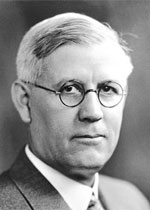
At Chico Clarence Knight Studley taught physics, geography, and geology, was department head, and was named vice president in 1918. When Osenbaugh died on December 5, 1930, Studley was named acting president until the arrival of Rudolph Lindquist in February 1931 He was commended by the faculty for the able way he managed the administration of the college in addition to his own duties.
He taught at the Mt. Shasta summer school and was an avid golfer.
He was married and had three children. He retired from Chico State College in 1945 and died in Chico in January 1951.
Rudolph D. Lindquist, President, 1931
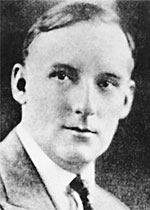
Rudolph D. Lindquist, born in Oakland, California, in 1888, began his teaching career in 1907 in rural Minnesota schools. After two years, he moved to Kansas to teach in private schools for two years before returning to California to attend the University of California, Berkeley. After receiving his degree in education in 1915, Lindquist served as vice-principal and football coach at Elko (Nevada) High School.
He returned to Berkeley in 1919 and served in numerous administrative positions while earning a master's degree. He became the assistant superintendent of schools in Oakland in 1927, a position he held until his appointment as president of Chico State Teachers College. He moved to Chico and assumed his new position on February 1, 1931, relieving Acting President Studley.
Lindquist was married and had a ten-year old daughter at the time of his appointment. Lindquist had served two years with the 363rd Infantry, including an overseas tour.
While at Chico State Teachers College, Lindquist became nationally recognized as an administrator, served on the California Curriculum Board, and frequently spoke at meetings and conventions of school administrators and teachers.
In spring 1931, Ohio State University approached Lindquist to develop and direct an experimental school for them. He accepted the position, which began in the fall of 1931. Lindquist directed the Thirteenth Annual Chico State Teachers College Summer Session at Mt. Shasta, Calif., (June 22, 1931 - July 31, 1931), and ended his association with Chico State Teachers College on August 1, 1931.
In 1943, he returned to California and served as superintendent of schools in Santa Barbara until his death in 1948 following an automobile accident.
Aymer Jay Hamilton, President, 1931-1950

Aymer Jay Hamilton graduated from Clarion (Pennsylvania) State Normal School and San Jose (California) State Normal School before enrolling at the University of California, Berkeley where he received his AB (1923), MA (1923), and his EdD (1927). Dr. Hamilton taught in rural Pennsylvania schools and worked as a school principal in Pennsylvania and California (Petaluma and Berkeley). At the college level, he taught at the University of California, Berkeley before teaching at the Claremont Colleges. He also taught summer sessions at the National University in Mexico City. In 1932, while president at Chico, he taught a summer session at Buffalo (New York) State Teachers College.
The first public reception for a Chico president was held for Dr. and Mrs. Hamilton in October 1931. In 1932, the school unveiled a growth plan and announced that ten majors, plus the traditional program in education, would be available in the 1932-33 school year.
Dr. Hamilton presided over substantial growth and constant change in his 19 years as president. The physical plant expanded beginning with the new library (now Trinity Hall) between 1931 and 1933. Campus landscaping, a California Travel College Cruise, extension courses, new registration methods, conversion of Bidwell Hall to a student union, the establishment of the Chico State College Foundation, and mid-year commencement exercises all began under Dr. Hamilton. He also saw the creation of numerous pre-professional programs (health, engineering, accounting, and others), housing for veterans, a snack bar and cafeteria, and a new industrial arts complex.
He dealt with numerous problems including severely restricted funding during the Depression and World War II. Major fluctuations in class size during the war were a recurring problem. The student population dropped from over 800 students in 1939 to 234 in 1942 before increasing to 1156 in 1947. Military service staff, and the Mt. Shasta Summer Session was moved to Chico to reduce expenses.
Towards the end of his tenure, ground clearing commenced for construction of new facilities for chemistry, music, theater, and numerous offices. He was honored with the naming of the Aymer J. Hamilton Elementary School in December 1949. In January 1950, plans for the first master's degree were announced.
In November 1949, Dr. Hamilton announced his retirement as of July 31, 1950, and ensured a smooth transition working with the new President, Glenn Kendall, after his selection and arrival in April 1950.
George Glenn Kendall, President, 1950-1966

Between 1925 and 1940, Glenn Kendall served as a teacher and principal in Kentucky schools before becoming superintendent of schools in Norris, Tennessee. From 1941 to 1945, he was chief of educational services in the Immigration and Naturalization Service. In 1945, Dr. Kendall became dean of education and director of Summer Session at the University of Maine. He then moved west to be chairman of the Division of Education and dean of Summer Session at San Francisco State College, positions he held until his appointment as Chico State College president in April 1950.
Kendall's 16-year administration covered tremendous growth from 1,540 students to nearly 6,000 and faculty increases from 78 to 305. Kendall re-organized the school administration several times to cope with the growth, first in 1950, and last in 1963. He faced fluctuating enrollment as the student body dropped during the Korean War, and then rapidly increased beginning in 1954, when new enrollment records were set, an annual event thereafter. Programs in agriculture, engineering, anthropology, social welfare, and nursing were developed during his presidency. The master's programs were developed and expanded. Despite the constant budget restrictions and delays, the physical plant increased by more than a dozen buildings during this time.
Dr. Kendall faced numerous campus issues during his tenure, culminating in the 1960s with faculty issues (including the newly formed State Faculty Senate), free speech issues, the beginnings of the Vietnam War protests, and civil rights activism.
Kendall, active in local civic organizations, was also active professionally and served as president of the Association of State Colleges and Universities during the 1964-65 academic year. He retired in 1966.
On September 16, 2001, Kendall celebrated his 100th birthday at a party hosted by the University and the community. He was presented with a California legislative resolution honoring his service. He died March 5, 2003 in Chico.
Robert Eugene Hill, President, 1966-1970

Robert Eugene Hill was born in Kincaid, Illinois, on December 9, 1925. Hill served with the United States Army in Korea, graduated from Illinois Wesleyan with a bachelor's degree in economics (1950), and earned an MBA in finance at Indiana University in 1955. In 1957, Hill received his PhD in finance from the University of Alabama.
Dr. Hill served as assistant professor of finance at the University of Illinois (1957-58) and then as chairman of first-year programs at the Illinois Graduate School of Business (1959-60). He moved to Kent State University as associate professor of economics-finance (1960-64) and then professor of economics-finance and dean of the College of Business Administration (1964-65). He was professor of economics and dean of the School of Business at Southern Illinois University at the time of his appointment to Chico State College.
Hill participated in numerous professional organizations, received many academic awards, published frequently, presented papers regularly, and obtained constant research grants. Hill also taught economics while president at Chico State College.
Hill presided over four turbulent years at Chico. Hill managed student tuition protests, faculty and student uproar over the Vietnam War, and presided over the opening of the Engineering Building, Taylor Hall, Whitney Hall and the Bell Memorial Union.
Hill announced his resignation as president on July 18, 1970. He resigned to take a position with W. Clement Stone, a Chicago philanthropist and Chairman of the Board of Combined Insurance Companies of America.
Lew Dwight Oliver, President, 1970-1971

Lew Dwight Oliver, born July 9, 1911, in Barnesville, Minnesota, received his BA at the Ecole Libre de Science Politiques (France), majoring in Political Science. A master's degree from the University of Arizona followed in 1934, and he earned his PhD in 1940 from the University of California, Berkeley. Oliver arrived in Chico in 1943 after teaching at the University of Arizona (1934-36), the University of California, Berkeley (1936-38), and Modesto Junior College (1940-43).
At Chico State College, Oliver taught history, served as chairman of the Social Sciences Division twice, and as History Department head. Oliver received an Outstanding Teacher Award for 1969-70. He also served as chairman of the Faculty Senate committees on Education Policies and Bargaining, and as president of the Faculty Senate. In 1969, Oliver became vice-president for Academic Affairs, a position he held until his appointment as acting president.
Upon his appointment, Oliver called for a year of "rest" after the previous four years of heightened activity. Oliver, however, faced constant pressure over faculty promotion, retention, and tenure issues as well as grievance procedures. Severe state budget cuts restricted faculty pay and positions. Student demonstrations and arrests as well as increasing housing shortages also occupied him. Oliver supported student involvement in campus administration, innovative teaching methods, and worked to balance financial resources and campus needs. Campus enrollment passed the 10,000-student level despite funding cuts for faculty positions. Oliver retired in June 1971.
Oliver was active in the community, serving 11 years on the Butte County Planning Commission, and also served on the Hospital Board. He was a member and past president of the California County Planning Commissioners as well as a member of the Merit System Board of the California Department of Social Welfare.
Oliver and his wife, Marcella, planned to travel extensively after his retirement, but he was slowed by health problems in 1972 and died in the San Francisco Presbyterian Hospital following a massive heart attack in May 1977.
Stanford Cazier, President, 1971-1979
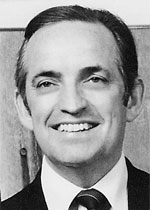
Stanford Cazier, born on June 11, 1930, in Nephi, Utah, obtained his BA (1952) and MA (1956) from the University of Utah, He subsequently earned a PhD in history at the University of Wisconsin in 1964. Cazier served as an Ensign in the U. S. Navy during 1952-53. He and his wife, Shirley, had three sons.
Cazier’s administration was marked by student involvement, faculty growth and unionization, campus expansion, and continual budget problems. Chico State College changed to California State University, Chico, on June 1, 1972. Plumas, Butte, Holt, and Éstom Jámani halls were completed in Dr. Cazier’s first two years. The Student Health Center was finished, the gym renamed Acker Gym, and the auditorium and administration buildings were remodeled under Dr. Cazier’s supervision.
Students protesting the arming of campus security personnel occupied the administration building in late 1975 and early 1976. Cazier also dealt with major community/campus issues such as the proposed re-routing of Warner Street and a planned multi-level garage on 2nd Street.
In April 1979, Dr. Cazier left CSU, Chico to assume the presidency of Utah State University, where he served until his retirement in 1992. The Science and Technology Library at Utah State University was named in his honor in 1998.
Despite the numerous emotional issues he faced in his eight years in Chico, he received generous praise from student leaders, faculty, staff, and system-wide officials for his accessibility, leadership, and support of all segments of the academic community.
t L. Fredenburg, Acting President, 1979-1980
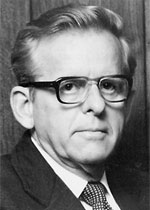
Dr. Robert Fredenburg served as acting president of California State University, Chico, from August 1979, following the departure of Dr. Cazier, until the arrival of Dr. Robin Wilson in August 1980.
Fredenburg was born in Antwerp, New York, on November 28, 1921. He earned a BA (1956), MA (1959), and a PhD (1965) from Syracuse University. His field was science education.
Following service with the U.S. Army in Europe (1942-46), Fredenburg operated a family hardware business in upstate New York, attended college part-time, and began his teaching career. In 1959, he arrived at Chico as a faculty member of the Physical Sciences Department. Fredenburg served as department chair, as chairman of the Faculty Council, and participated in numerous department, college, and university committee projects. Dr. Fredenburg also served as a consultant to numerous Northern California school districts.
In 1969, Dr. Fredenburg moved into administration and filled several positions in Academic Affairs, including director of International Programs, and dean of Undergraduate Education before being named vice-president for Academic Affairs in 1977.
During Dr. Fredenburg’s year, the state budget crisis continued to complicate university affairs. A great deal of Dr. Fredenburg’s time was dedicated to supervising the planning for potential budget cuts. Campus protests over draft registration and the Iranian hostage situation disrupted campus, but drew support from Dr. Fredenburg as legitimate free speech activities.
Following Dr. Wilson’s arrival in August 1980, Dr. Fredenburg returned to his duties as vice-president for Academic Affairs.
Dr. Fredenburg and his wife Marjorie had five children. He remained in Chico until his death April 8, 2000.
Robin Wilson, President, 1980-1993

Wilson was born in Columbus, Ohio, September 19, 1928. He received his BA (1949) at Ohio State University and then served with the Merchant Marine for a year. Returning to school, Wilson earned his MA in 1951 at the University of Illinois. He began his PhD program, but a stint in the United States Navy interrupted his academic career. Wilson served as a cryptographic watch officer in England and then entered operational intelligence (anti-submarine warfare) and ended his military career at Norfolk, Virginia. Wilson returned to the University of Illinois and completed his PhD in English in 1959.
Dr. Wilson worked for the Central Intelligence Agency until the mid-1960s when he returned to the academic world. Wilson taught English and organized writer workshops at Clarion State College (PA), Tulane (LA), and Michigan State University. He published several science fiction novels and served as a consulting editor for the Journal of Higher Education. He continued to write and publish throughout his academic career.
During his time at California State University, Chico, Dr. Wilson faced continual budget problems caused by California’s faltering economy during the 1980s. Sizeable budget cuts, merit pay procedures, and over-enrollment issues recurred throughout his tenure.
Although Dr. Wilson promoted academic excellence, stressed technological improvements, increased grant funding, and improved financial management practices, his administration had numerous controversial moments. Wilson canceled the 1987 Pioneer Days after riots broke out, and, following a Faculty Senate resolution in 1991, asked the ROTC program to leave campus by 1994. Wrestling and swimming were dropped as funded athletic programs in the late 1980s.
In 1986, Dr. Wilson approved the change from “schools” to “colleges” at California State University, Chico. The student union expansion began, Nettleton Stadium was upgraded, and the Housing office extension was completed under Dr. Wilson. The O’Connell Technology Center opened in the fall of 1992, and Tehama Hall was also completed during Wilson’s time on campus. The TRACS registration system began in January 1993 as well.
Following his retirement in July 1993, Dr. Wilson moved to CSU, Monterey Bay as a trustee professor. Robin and Patricia Wilson have three daughters and one son.
Manuel A. Esteban, President, 1993-2003
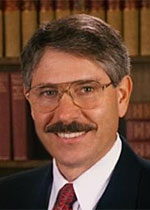
Dr. Esteban assumed the position of president of CSU, Chico in August 1993. Prior to coming to CSU, Chico, Esteban was provost and vice president for academic affairs at Humboldt State University for three years. From 1987 to 1990, he was dean of the School of Arts and Sciences at California State University, Bakersfield.
Dr. Esteban was a professor of French and Spanish. He began his teaching career at the University of Michigan-Dearborn in 1973. In 1984, he was named associate dean of Arts, Sciences and Letters, and then served as acting dean from 1986 to 1987.
Esteban received his bachelor of arts degree in French in 1969 and his master’s degree in Romance studies in 1970 from the University of Calgary. He received his PhD in French from the University of California, Santa Barbara in 1976.
He served in several national organizations (the American Council on Education, the American Association of State Colleges and Universities, and the U.S. Distance Learning Association) and regional organizations (the CSU Commission on Extended Education, the CSU Institute for Teaching and Learning, and the California Joint Policy Council on Agriculture and Education). He was also a member of the Sierra Health Foundation in Sacramento and the Enloe Medical Center in Chico.
The accomplishments during his presidency include the successful reaccreditation by the Western Association of Schools and Colleges, development of the University Strategic Plan, establishment of the Center for the Excellence in Teaching and Learning, the creation of the University Research Foundation, the expansion of the University Advisory Board, and the establishment of the President’s Scholars Program.
Scott G. McNall, Acting President, 2003-2004
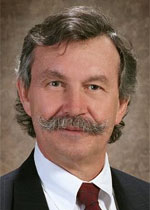
Provost and Vice President for Academic Affairs Scott McNall assumed the post of interim president of California State University, Chico on July 1, 2003.
Dr. McNall was appointed provost at CSU, Chico by President Esteban in April 1994. Prior to that, he had been dean of the College of Arts and Sciences for five years at the University of Toledo.
Dr. McNall was chair of the sociology department at the University of Kansas for 10 years and also served as chair of the American studies department. He has held academic positions at Arizona State University, University of Minnesota, and University of Oregon, where he earned his PhD in sociology. He did his undergraduate work at Portland State University.
As both provost and interim president, McNall championed the establishment and expansion of the Bidwell Environmental Institute (now the Institute Sustainable Development).
Paul J. Zingg, President, 2004–2016
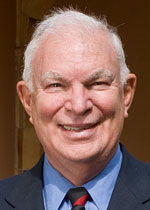
Dr. Paul J. Zingg was appointed president of California State University, Chico in 2004. Prior to being named president at CSU, Chico, Dr. Zingg was provost and senior vice president for Academic Affairs at California Polytechnic State University, San Luis Obispo from 1995 to 2004. Before that he served as the dean of the College of Liberal Arts at Cal Poly, 1993-1995.
Dr. Zingg served as dean of the School of Liberal Arts at Saint Mary’s College of California from 1986 to 1993. Previously, he spent several years at the University of Pennsylvania, serving as executive assistant to the president and as vice dean of the School of Arts and Sciences. He has held professorships in history at all the institutions he has served.
Zingg received his PhD in history in 1974 from the University of Georgia, Athens; an MA in history in 1969 from the University of Richmond, VA; and a BA in history in 1968 from Belmont Abbey College, North Carolina.
He has published 10 books and nearly 100 articles on American higher education, student learning, educational leadership, sports history, and intercollegiate athletics. He has also acted as a sports history consultant to several presses, the media, museum curators, and on Ken Burns’ acclaimed television documentary series, Baseball, in 1994.
Dr. Zingg was appointed a fellow of the American Council on Education in 1983-1984, has received support for his research from the National Endowment for the Humanities, and has served on several national boards and commissions for higher education.
Gayle E. Hutchinson, President, 2016–2023
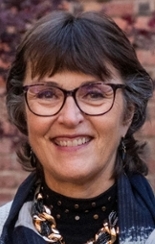
Dr. Gayle E. Hutchinson was selected to lead CSU, Chico in 2016, becoming the first female president in the University’s history. She previously held the position of provost and vice president for Academic Affairs at California State University, Channel Islands from 2013 to 2016, where she was instrumental in helping to develop the university as one of the fastest growing and most innovative campuses in the CSU system.
Hutchinson began her career in higher education at CSU, Chico, spending nearly 20 years in various instructional and leadership positions. She joined the campus as an assistant professor in the Department of Kinesiology in 1990. She taught in the classroom for 17 years, earning tenure, promotion, and the rank of full professor. She chaired the department from 2002 to 2007. As a faculty member, she was highly engaged in the Academic Senate and CSU Statewide Senate. After participating in the prestigious American Council on Education Fellows program (2005–2006), Hutchinson applied for and earned the position of Dean of the College of Behavioral and Social Sciences (2007–2013). Hutchinson’s scholarship and grant writing focused on teacher socialization, social psychology of sport, comprehensive school-based wellness programs, and equity in sport and physical education.
Earlier in her career, she served as the principal investigator and co-director of the Northern California Physical Education – Health Subject Matter Project and the project director for the Pacific Wellness Center and developed curriculum and taught physical education in elementary schools.
She holds a bachelor’s degree in physical education teacher education from the University of Massachusetts, Amherst; a master’s from Teachers College, Columbia University in teaching analysis & curriculum development; and a doctorate of education from University of Massachusetts, Amherst in teacher education/staff development.
President Steve Perez, 2023-present
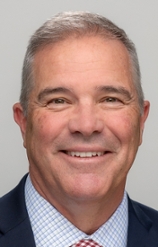
Dr. Steve Perez became Chico State’s 13th president on July 1, 2023, after serving as the University’s interim provost and vice president for Academic Affairs. As president, he intentionally focuses on building and maintaining strong teams that will work hard every day to support the success of Chico State students, colleagues, and the region.
Prior to coming to Chico State, Perez served as interim president from January to December 2022 at San Jose State University, where he kept the institution on an upward trajectory during a time of transition. Perez was previously provost and vice president of Academic Affairs at Sacramento State. Over his two decades of service to that university, he also served as associate professor, professor, assistant to the president for special projects, faculty athletics representative, interim dean for the College of Business Administration, and interim provost.
During his time teaching, Perez taught macroeconomics at all levels, as well as econometrics, sports economics, labor economics, and mathematics for economists. His research has explored most macroeconomic topics, but a specific interest has been evaluating the ability of econometric techniques to discover the truth, issues of causality in macroeconomics, and sports economics. His articles appear in many economics journals, including The Journal of Sports Economics, The Journal of Monetary Economics, The Econometrics Journal, Economics Letters, The Journal of Economic Methodology, Public Finance and Management, The Journal of Economics and Business, Oxford Bulletin of Economics and Statistics, The Journal of Money, Credit, and Banking, Applied Economics, and The Journal of Macroeconomics.
After receiving his bachelor’s degree in economics at the University of California, San Diego, Perez received his PhD in economics from the University of California, Davis in 1994. He taught economics at Virginia Commonwealth University and Washington State University. before coming to Sacramento State in 2001.
